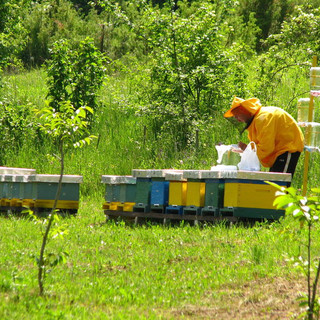Honey Land of Northern Krk - OPG Almaši
- Andrea Seifert

- Aug 23, 2016
- 3 min read
In Ancient Greece, The Greek Great Mother was known as the Queen Bee, and her priestesses were called Mellisae, the Bees. The honey bee was a sacred symbol of Artemis (Roman Diana), goddess of chastity, virginity, the hunt, the moon, and the natural environment. Thus, the island of Krk is from the dawn of antiquity connected to the Greek deities. The Greeks were handling commerce with the Iapodian and Liburnian (Illyrian) tribes on the Apsyrdites and Elektrides islands (today the Kvarner islands), especially because these islands were place for amber selling.
And as the amber has such a honey-like colour, so is the Krk island known as the „Golden Island“. We might say, as it is true for the olive oil, so it is for the honey production, especially in its northern part. The scenery on Krk may well be the same as in any other Mediterranean island, and it is very much possible to imagine Aristaeus and Dyonisus traversing the karstic slopes, hiding in macchia shrubland, with bees roaming around.
In this northern Krk area diligently work the bees of Mr Mirko Almaši, one of Croatia’s top beekeepers and professional honey sensory analist. His beehives are located around Omišalj, and in cooptation with the bees Almaši makes honey, honeydew, beeswax, pollen, propolis and apitoxin. Main honey sort is sage (salvia), but there are other combinations, as the bees use the pasture full of medicinical Mediterranean herbs.
The Greek writer Oppian of Apamea says in Cynegetica that Aristaeus was the first who closed the bees into a hive after he took them from an oak-tree. Ovid says that Dyonisus discovered the first natural beehive – a hollow tree. Bees were called “Birds of the Muses” because of their connection to the Muses, who were first nymphs of inspiring springs and then goddesses of poetry, arts and science. One old myth says the muses in the form of bees guided the ship of Ionians from Athens to their home. Sophocles, Plato, Vergil, Lucan are said to had their lips touched with honey as babies.
Today, the hives are more modern, but they still have the same use – it is the place where magic happens. And while it does, bees are pollinating up to 80 per cent of our plants, fruits, and vegetables. Mr Almaši points to this fact, which scares us, as we hear more and more bees are dying all over the world, and no one knows why.
Not only that we cannot survive without bees, we can use their products for our health. It is believed that honey passed as therapeutic means from the Egyptians to the Assyrians and Babylonians. It was called ambrosia, the food of the gods! Early thinkers like Homer, Pythagoras, Ovid, Democritus, Hippocrates mentioned that people should eat honey to preserve their health and vigour. For example, the apitoxin, produced by Mr Almaši, is excellent product for the cardiovascular system and high pressure. Royal jelly is proved protection against cancer, and all the bee products are rich in minerals and the characteristics of the region where they grow. In Krk it is unmistakably the herbs which give the most flavour to the honey.
But it is not only the honey for which Mr Almaši gets so many awards and prizes. It is the honeydew. Instead of taking nectar, bees can take honeydew, the sweet secretions of aphids or other plant sap-sucking insects. Honeydew honey is very dark brown in colour, and is sometimes called the forest honey. It has a rich and thick fragrance, with maximum of 15 per cent water inside.
Almaši’s honeydew honey is labelled as the Croatian Island Product, a brand whose main objective is to identify and distribute quality island products which will be recognised as such both in Croatia and abroad. His honey products are featuring the Krk Glagolitic letters and Omišalj’s Rosetta on the place’s church. Guessing the tastes of Almaši’s honey is spectacular, especially when it is flavoured by the Mediterranean herbs.
His products could be found on various fairs in Krk and Croatia, but the best way is to contact Mr. Almaši himself:
Almaši Mirko Mali Kijec 35, 51 513 Omišalj Tel:00385 (0)91 526 4934 mirko.almasi@ri.t-com.hr
Text by: Vedran Obućina Photos by: Bruno Vignjević




















Comments